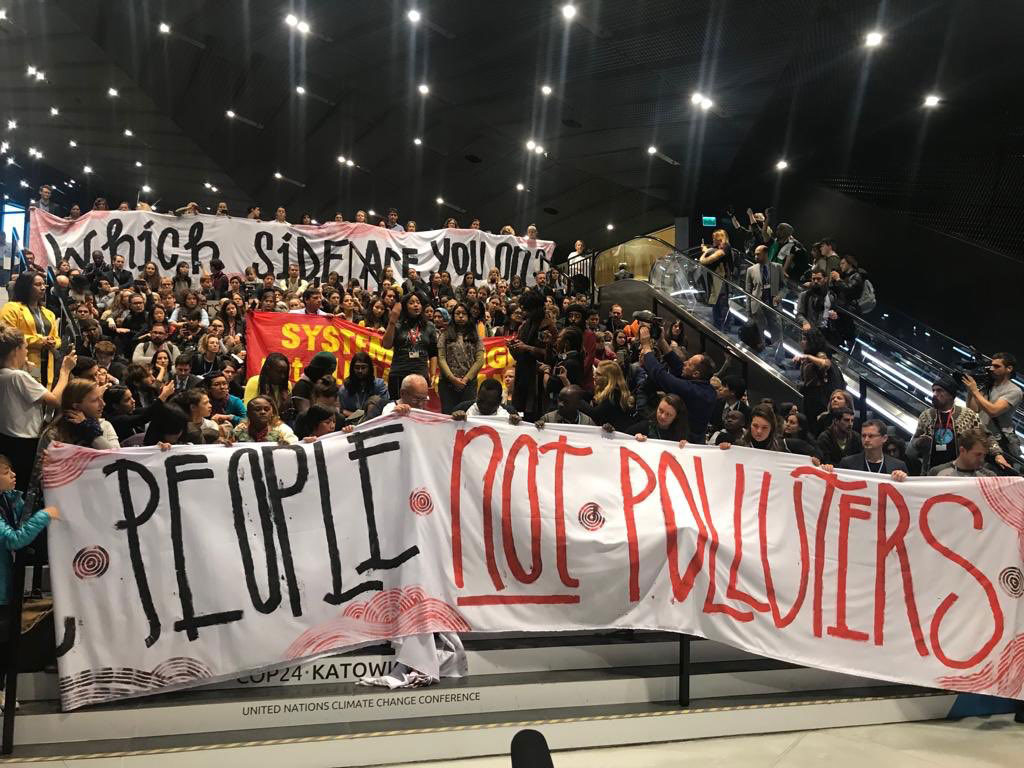
Hundreds of activists challenge governments to put people over polluters’ profits on the last day of the COP24 climate treaty negotiations in Poland in December 2018. The movement to kick Big Polluters out has grown mightier than ever.
The annual U.N. climate treaty meetings in Bonn, Germany, are here, and make no mistake: Though they tend to keep a low profile in the media, these meetings are the real deal. Here, every year, climate policy is developed and negotiated that affects millions of people’s lives.
The world’s most polluting corporations know how important these meetings are. That’s why they and their proxies show up with legions of lobbyists, pulling out all the stops to block, weaken, and delay the truly just, transformative climate solutions that might disrupt their status quo.
And it’s why Corporate Accountability and our allies from around the world show up, too: to challenge Big Polluters and the Global North governments doing their bidding, and amplify your voice demanding swift, urgent, just action to address the climate crisis.
Here are two key things to keep an eye on in the lead-up to and during the talks, which begin this Monday, June 17.
1. The call to protect U.N. climate treaty negotiations from Big Polluters’ interference.
What it is:
Four years ago, we and our allies launched our campaign calling to kick Big Polluters out of climate policy. Backed by hundreds of thousands of people like you around the world, government delegates from the Global South have been uniting to demand a conflict-of-interest policy that could protect the U.N. climate treaty from industry interference.
Powerful Global North governments, like the U.S. and EU, have consistently sided with Big Polluters to maintain the status quo—but polluting industries’ conflicting interests are back on the agenda this year, and the movement to kick Big Polluters out is stronger than ever.
Why it matters:
The U.N. climate treaty is a critical forum for international cooperation on the global scale that the global problem of the climate crisis requires. Yet since its inception more than two decades ago, it’s consistently failed to deliver the just solutions we need.
It’s no secret why: The likes of Shell and Chevron roam the halls, lobbying delegates and hosting events to water down, delay, and obstruct meaningful climate policy—while every year, more and more people suffer the devastating impacts of a rapidly changing climate.
We know that clearing out the polluting elephant in the room is a long-overdue prerequisite to advancing meaningful safeguards for people and the planet.
What to watch for:
All eyes are on the conflicts-of-interest conversation this year. But we’re not just waiting to see what happens; we’re mobilizing.
Stay tuned and check back on our “Polluters out, people in!” blog roll for ways you can take action to support the team on the ground in organizing to kick Big Polluters out.
2. Real solutions for climate justice vs. industry-driven schemes.

For years, Big Polluters and their proxies like the International Emissions Trading Association (IETA) have pushed hard to advance industry-driven schemes like carbon markets over true, just solutions to address the climate crisis.
What it is:
This is about to get wonky—but just for a minute, so stick with us: One section of the Paris Agreement, called Article 6, is supposed to lay out ways governments can collaborate to address the climate crisis. And at these talks, delegates will be hammering out exactly what that means (by developing what are formally called “guidelines for Article 6”).
Why it matters:
Big Polluters and their proxies have a twisted view of what international cooperation looks like—namely, they only want measures that allow them to keep extracting, burning, and profiting from fossil fuels. So they’re pushing to make the Article 6 guidelines focus exclusively on market-based schemes—which have failed time and again to reduce carbon emissions, but do maintain the status quo.
Meanwhile, the climate justice community has laid out a vision for international cooperation that will meaningfully and justly address the climate crisis: things like sharing renewable energy technology, harnessing agroecological practices, and transferring knowledge and funding. (Read more in the People’s Demands for Climate Justice.)
What to watch for:
This is the one part of the Paris Agreement guidelines that has yet to be finalized, so you can expect it to be front and center. Again, you can be sure a handful of Global North governments will shill on behalf of Big Polluters—while justice-oriented Global South governments already bearing the brunt of the climate crisis, backed by people across the climate justice movement, demand real solutions and collaboration.
Stay tuned for ways you can join in solidarity on the side of climate justice.
Over the next two weeks, check back on our “Polluters out, people in!” blog roll for updates on these and other key developments at the climate talks. And stay tuned here and on our social media channels (Facebook, Twitter, LinkedIn, and Instagram) for ways that you can join in solidarity with our team on the ground and the global climate justice movement to challenge Big Polluters and advance just climate solutions.
This blog post is part of “Polluters out, people in!“–our series of dispatches from the global climate talks in Germany. Read more here.






